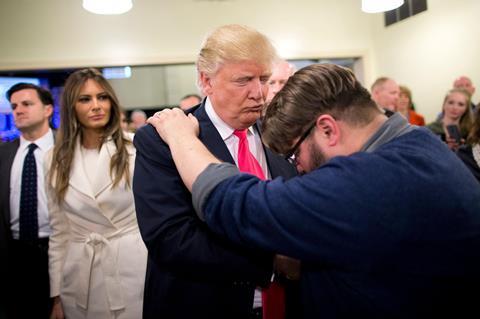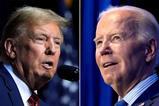As Donald Trump celebrates an overwhelming victory in the US’s first election contest of 2024, Jared Stacy notes that most white evangelicals are among his supporters. What does this mean for the future of the American Church?

Former President Donald Trump is the far and away frontrunner for the Republican nomination for the American Presidency in 2024.
In what promises to be one of the most divisive and consequential elections since, well, the last one just four years ago. It’s worth considering what is at stake, not only for American democracy but also the Church in America.
First, a bit of a primer on the political situation. In the US party system, parties run what are called “primary elections” before the general election. Primary elections determine who the party will elect as their candidate.
Last week, Trump won the first round of the Republican primary election, called the Iowa Caucus, by a landslide - receiving a strong 51% of the vote.
This is notable for two reasons. Firstly, the results demonstrate that despite the uprising on January 6, Trump remains in a strong position electorally. Secondly, despite Trump facing as many as 91 criminal charges, in Iowa at least, the majority of evangelicals (55 per cent) still voted for him.
His campaign also created a stir last week with a video “God Made Trump” that compared Trump to Jesus:
Trump has joked that he would only be a dictator on his first day in office. He has claimed immigrants are “poisoning the blood of America” and his campaign is consistently promising retribution against domestic enemies while framing his legal challenges as his undergoing a Messianic trial on behalf of his supporters.
Guilty verdicts in Trump’s many legal challenges might send him to prison. But guilty verdicts might be avoided if his campaign and legal team can just create enough gridlock to get him into the White House.
Trump could win
The reality of multiple trials lends plausibility (however delusional) among voters that Trump is “politically persecuted.”
68% of Iowa voters believed the 2020 election was stolen from Trump. It doesn’t matter that most claims of election fraud have been disproven in the courts, this is still the belief.
The partisan system and digital revolution has dumped suspicion into the stream of an American society that was already polluted. If voters continue to believe he is “persecuted” for taking on the “Deep State” as called by God, Trump may end up in the White House. In the Oval Office, his legal challenges might theoretically be suspended, igniting a legal crisis over whether a President can perform a self-pardon, for example.
I don’t believe the collapse of American society is likely, but could it be radically transformation through the slow but sure erosion of democratic and procedural norms brought about by absurd legal complexities and gridlock? After 2024, elections may not stop in America, but they may not be as significant after a second Trump Presidency. Autocrats still call for elections, and they always win. See, Russia or Hungary.
I realise this may sound sensational or reactionary. We should not use words like “fascist” lightly, and we should realise that not everything can or should be compared to 1930s Germany. Nevertheless, we should be clear: Trump’s ongoing insistence the Presidency was “stolen” from him is not just untrue, it’s incredibly damaging for American democracy.
The Stakes for the Church in America
My wife and I are Americans, living in the UK. And we’re often asked our opinion on Trump and the political situation in the States. There are a lot of things we could say, but perhaps the simplest analogy for interested outsiders is this: you should think of America as Gotham, the fictional and corrupt city of the Batman universe. And what Batman calls “Gotham” the Bible calls “Babylon.”
America is facing a dire political and social situation by virtue of our own corruption. For all our belief in American exceptionalism - that we are unique, special, even chosen - we are remarkably like what the Bible has proclaimed over all empires: “Fallen, fallen is Babylon the great!” (Revelation 18:2)
The American political situation reflects the people we’ve become, the people we are. The crisis of democracy is a crisis of discipleship. And we ought to recognise that, even though “evangelical” is largely now associated with “Trump” the Church in America is not synomous with “evangelicals”. It is far broader.
It is nearly impossible to exorcise the zeal bound up in the creed of “making America great again”
Ensuring the survival of the United States is not the primary task of the Church in America, and American evangelicals are not at the centre of economy of God’s salvation. The support for Trump among white evangelicals, however concerning, is by this point largely predictable. We need to move onward by asking: “what is our responsible witness?”
Political fanaticism rejects dialogue, reducing conversation to swapping slogans. Bonhoeffer lamented this very fact in the wake of the rise of the Third Reich. In America today, it is very hard, nearly impossible, to exorcise the zeal bound up in the creed of “making America great again.” And so, like Bonhoeffer said, there are perhaps only two ways to be Christian nowadays: prayer and doing justice among human beings.
There is hope in this responsible resistance and witness. I’m not talking about “repairing” evangelicalism like a PR job. But about really asking ourselves what it means to be responsible as Christians in America right now.
There are very real political stakes in this American election. But however consequential a Trump administration will be for geo-politics, the one thing the Church in America knows is that the only way to life is resurrection. And that’s not an analogy directed towards saving democracy, as much as it is a subversive imagining of God’s political community of brotherhood.
The question confronting the Church in America is whether or not we will bear witness to the one truth that our politics cannot and does not know: “I am among you as one who serves,” said Jesus. This has to mean the Church cannot fall in line with political causes of retribution, and must bear witness to the reconciling presence of Jesus, not just for America, but for all humanity.





































2 Readers' comments